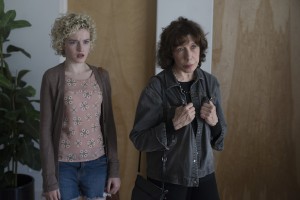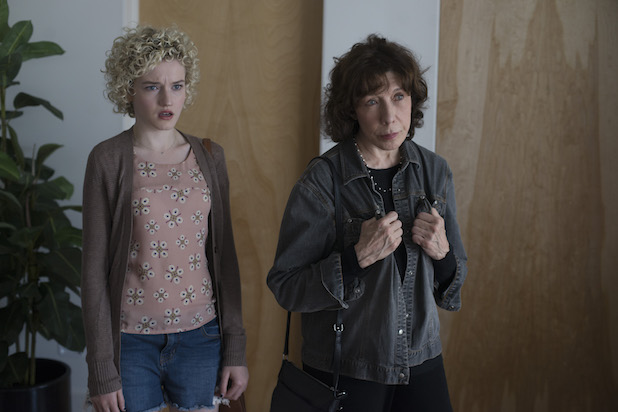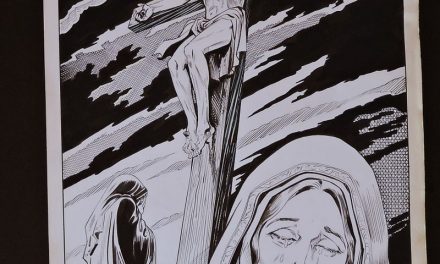 If you haven’t seen the highly acclaimed film Grandma, starring Lily Tomlin and Julia Garner, you might be surprised to discover that this comedy is about a young woman who asks her grandmother to help her get enough money for an abortion—and about the day they spend together on their mission to get the money. While the movie is labeled a comedy, the material is heavy. While Lily Tomlin’s performance is outstanding, showing the character’s brokenness and imperfections throughout, I ultimately found that what was most disappointing was the film’s presentation of feminism. There was a total lack of curiosity about good sex, intimacy, social justice, and what a fully flourishing life can or should look like for women. Instead, feminism was reduced to the right to secure an abortion, seemingly without the need to think critically about anything other than how to pay for it. Is this what feminism really means?
If you haven’t seen the highly acclaimed film Grandma, starring Lily Tomlin and Julia Garner, you might be surprised to discover that this comedy is about a young woman who asks her grandmother to help her get enough money for an abortion—and about the day they spend together on their mission to get the money. While the movie is labeled a comedy, the material is heavy. While Lily Tomlin’s performance is outstanding, showing the character’s brokenness and imperfections throughout, I ultimately found that what was most disappointing was the film’s presentation of feminism. There was a total lack of curiosity about good sex, intimacy, social justice, and what a fully flourishing life can or should look like for women. Instead, feminism was reduced to the right to secure an abortion, seemingly without the need to think critically about anything other than how to pay for it. Is this what feminism really means?
I want to avoid spoilers, so I won’t explain the plot points and twists of the film in too much detail, except to say that as the film goes on we come to understand more about the grandmother’s past and about why she is hurting. We also see some dysfunctional family dynamics in the ways that the three generations of women (grandmother-Elle, mother-Judy, daughter-Sage) relate to each other.
But I believe the portrait of feminism is flawed, in a few important ways:
- Resistance to Vulnerability
Grandma is tough. For her, feminism is about standing up for yourself. She cuts up her credit cards to prove that Wall Street doesn’t control her. She rebukes her granddaughter for failing to stand up to her no-good boyfriend, the father of her unborn child. Grandma is good at yelling. But she isn’t very good at sitting with vulnerability and disappointment and grief. She isn’t very good at showing affection. So it is strange to me that Grandma is the voice of feminism in this script. Grandma is citing Simone de Beauvior and other so-called grandmothers of feminism but her message of empowerment for her granddaughter equates to conformity with a rhetoric of “freedom=abortion on demand.” Grandma never asks Sage what she really wants. Neither does Sage’s mother, Judy, who is very controlling, both in her personal and professional life. So Sage has two women in her life who claim to be feminist role models, and neither is able to express vulnerability or to show empathy. Neither has the maturity or thoughtfulness to sit with Sage in her confusion and ask her questions about what she really wants and who she really is. Instead, there is a rush to “fix” the problem—a problem never discussed with any kind of nuance or depth. The whole story takes place in one afternoon.
- Silence about Alternatives to Abortion
Which brings me to my second concern, namely that the film does not present any alternatives to abortion for women who face unplanned pregnancies. Sage has no serious conversation with her partner, her mother, or her grandmother about either raising the child or giving birth and placing the child with adoptive parents. It is as if these options do not exist for the filmmaker. And what kind of message does that send for moviegoers? The fact is that many women who have had abortions felt like there were no other good options for them. For example, the Guttmacher Institute Abortion Fact Sheet explains:
The reasons women give for having an abortion underscore their understanding of the responsibilities of parenthood and family life. Three-fourths of women cite concern for or responsibility to other individuals; three-fourths say they cannot afford a child; three-fourths say that having a baby would interfere with work, school or the ability to care for dependents; and half say they do not want to be a single parent or are having problems with their husband or partner.
These data reveal that women who face unplanned pregnancies often feel torn between multiple responsibilities and roles. Many believe they do not have any other good options. They believe abortion is their only choice. Grandma seems to assume that this is so.
- No Discussion of Good Sex and/or Sexual Justice
A third issue I had with this film is that it misses the opportunity to have the characters discuss, or at least have the audience think critically about, sex. What is sex for? What is good sex? There is no discussion of empathy, intimacy, concern for a partner’s well-being, or any kind of true happiness in a sexual relationship. Sage doesn’t like feeling used by her boyfriend, but she doesn’t seem to have any other way of thinking about sex, and this is never explored in conversations between the three women. To be responsible, in this portrait, is to use condoms to prevent unwanted pregnancy, and to have an abortion if that fails. But what a thin view of responsibility this is. Sage says in the film that she wants to have a family, wants to find true love, and she knows that her boyfriend is a loser. But she needs friends and role models who can help her to figure out what that means for her in her own life.
A Better Way?
Obviously abortion is a complex issue, and a single film cannot do full justice to this complexity. But we should try. Grandma would have been a more compelling narrative if the characters had more depth. A film that tries to explain feminism should help the audience wrestle with the parts of our life that are beyond our control. An expanded understanding of responsibility must mean that we think more deeply about how we respond to the unexpected, assuming that life will bring unexpected troubles as well as unexpected joys. As Sidney Callahan said so wisely over thirty years ago in “Abortion and the Sexual Agenda: A Case for Prolife Feminism”:
Morality also consists of the good and worthy acceptance of the unexpected events that life presents. Responsiveness and response-ability to things unchosen are also instances of the highest human moral capacity. Morality is not confined to contracted agreements of isolated individuals. Yes, one is obligated by explicit contracts freely initiated, but human beings are also obligated by implicit compacts and involuntary relationships in which persons simply find themselves. To be embedded in a family, a neighborhood, a social system, brings moral obligations which were never entered into with informed consent.
For Callahan, just because a pregnancy is unplanned does not mean that it must be terminated. Rather, she hopes women will see their reproductive power as a good in itself even though pregnancy carries involves self-giving sacrifice that is not required of male partners.
Which brings us to another aspect of pro-life feminism: social supports. Callahan argued in 1986 that to obtain true equality to men, women needed “1- more social support and changes in the structure of society, and 2- increased self-confidence, self-expectations, and self-esteem.” The same is true today. Equal access to education, equal access to health care, equal access to comprehensive sexual education, equal opportunities for employment, paid family leave, affordable child care, affordable health care for children and dependents, affordable housing, public school, safe playgrounds and parks, freedom from intimate partner violence, an equal place at the table and in the sacristy… this is what a pro-life society would look like. This is what the culture of life would look like. It is called social justice, and this is what Christian feminism advocates. In the absence of such a social system, all members of the culture bear responsibility when women with unplanned pregnancies do not see any alternatives to abortion.
What would a Christian feminist response to Sage look like? For starters, it will begin with accompaniment and mercy. I would sit with Sage in her pain and confusion and listen to her. I would tell her how sorry I am that she was treated so badly by her boyfriend. I would say there are no easy answers, no quick fixes, to what she describes as a problem, her unplanned pregnancy. I would ask her what kind of person she wants to be, what are her hopes and dreams and passions? Why does she think this pregnancy prevents her from being her true self? Is it possible that there might be new opportunities here that she never planned but can yet respond to with openness? What kind of world does she want to live in? What kind of social supports would she need to carry this baby to term? Do those supports exist? Because perhaps she has more resources and supports than she realizes. Perhaps what seems to be impossible might not be so impossible after all, now that she knows she has a friend who is there to help her. Of course this decision must be her own, but from a pro-life feminist perspective, Sage deserves better. Feminists for life have the motto: Women deserve better than abortion.
I am not opposed to films about the reality of abortion. We need such films so that we can continue to understand this social phenomena. But great films can immerse us in complex ethical worlds, invite us to think about the good life or ethics in a new way, challenge us to walk in someone else’s shoes for a bit, and invite us to explore other social worlds different from our own. Great films, especially great films that claim to be feminist, can educate and motivate audiences for social justice; unfortunately this one does neither.





Wow, nice article Emily. The movie and your review of it, working together as a team, seem to do a great job of exploring this topic.
A young woman named Sage finds herself with a grumpy grandma, and an unwanted pregnancy. Not being Catholic, Sage looks to a service like Planned Parenthood for assistance. In her conversation with such a service she will receive technical information, and perhaps a message about her right to choose.
In your section “What would a Christian feminist response to Sage look like?” I thought you did a great job of suggesting how such a conversation with Sage can be expanded and made more supportive.
My reply to your question would be that a Christian feminist response to Sage is going to sound a lot like empty silence unless you can find a way to get in to the room where the conversation with Sage is happening.
Like most women considering an abortion, Sage is not Catholic. So she’s not reading this blog, and won’t be consulting a priest. She will instead turn to those who have the technical means to resolve her situation. How will you get yourself invited in to that conversation? How will you reach Sage, where she has chosen to be?
The real test of your excellent article may be not whether it is accepted by editors on a Catholic blog, but whether it would be published by the editor of an abortion related blog that Sage is actually reading.
There’s a larger point here which may apply to a great deal of Catholic writing. Having a morally perfect message is of little use unless we also have an effective means of delivering that message to those who don’t already agree with us.